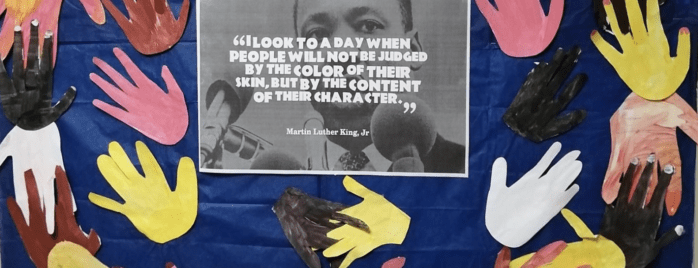Becoming a more equitable and inclusive PSS
Over the last few years, here at PSS we’ve been doing lots of work to help make our organisation the most welcoming, diverse and inclusive place it can be. We want to make real, long-lasting changes to how we do things so that PSS becomes even more welcoming to people; no-matter who they are, where they’re from, what their background is, if they’ve got any disabilities, what they believe in, who they love or how they identify themselves. We’re looking at how systemic issues are impacting people at PSS, and how we can build an equitable and inclusive culture.
Our work with Social Justice Collective
We’re aware that, unless you’re experiencing them, it can sometimes be hard to see inequalities. To help us on our journey, an amazing organisation called Social Justice Collective is working alongside us. Pari, Hannah, Tasmia and Shivani are a group of women and non-binary people of colour who specialise in helping organisations like ours make meaningful change, and they’ve taken a close look everything we do:
- Our culture, values and belonging – whether PSS is a place marginalised people feel supported, heard and valued
- Representation, power and leadership – whether there’s equal and diverse representation throughout our organisation
- Learning and awareness – whether our teams, leaders and Board fully understand what anti-oppression is and if we’re all committed to learning and challenging ourselves and each other
- Policies and processes – whether we’ve got policies and procedures in place that benefit and support marginalised staff, making it really easy to see how we should address any cases of oppression or discrimination at PSS
How Social Justice Collective did their audit
We gathered up examples of everything from our job advertisements and recruitment policies through to our comms and learning for Social Justice Collective to go over with a fine-tooth comb. Social Justice Collective also held focus groups at the start of 2023 to chat to PSS people from different marginalised groups, Shared Lives carers and managers, to find out how people are feeling at PSS and what they’ve experienced.
What did Social Justice Collective discover?
Social Justice Collective told us they could see how much effort has gone into trying to make changes to become more equitable and inclusive – and they could see that our intentions to do the right things are very clear. For example, introducing our new blind recruitment system, unconscious bias training for our teams, and producing resources for our teams to learn from. But what we’ve been doing so far isn’t enough.
The results of the audit have shown us that our organisation isn’t as equitable and inclusive as it could be because of some systemic barriers that we hadn’t seen for ourselves. We also heard how some of our team members from marginalised groups have had negative experiences while working with us.
Although this has been really hard to hear, this is exactly why it’s been so important to have an organisation like Social Justice Collective come and work with us to help us dig deep, understand the problems and find the best ways to put them right.
We’ve now got a really clear list of changes we can make to help PSS become a better place, and we’re pleased to be working towards becoming the organisation we want to be.

